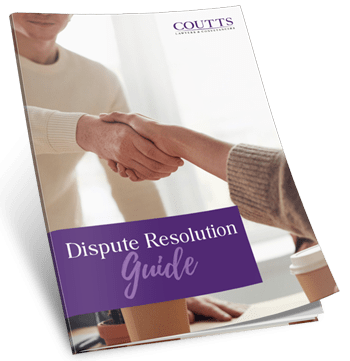We’ve Got You Covered
Navigating the complexities of property and lease disagreements demands skilled legal intervention. Our team excels in addressing and settling a broad spectrum of property and lease-related disputes. Trust in our expertise to efficiently manage and resolve your property and lease disputes, ensuring your interests are protected and your peace of mind is secured.

Melissa Care
Senior Associate
Book Your Property & Lease Dispute Consultation Now
Understanding Property & Lease Disputes
Property law is often one of the most complicated legal issues and is often the foundation of many legal disputes. Our experienced dispute resolution team can advise you on all types of property disputes including:
- Co-ownership disputes
- Commercial Leasing disputes
- Defective workmanship
- Breach of contract disputes
- Retail Lease Disputes
- Residential Tenancy Disputes
- Boundary Disputes
- Fencing Disputes
- Strata Disputes
What are the risks of Property and lease disputes?
Property dealings come with a set of challenges that can escalate into protracted disputes, affecting your investments. Whether it’s lease disagreements or property rights, Coutts offers comprehensive solutions, ensuring your real estate endeavours remain dispute-free.
Book Your Property & Lease Dispute Consultation Now
What to Expect with Coutts Lawyers
Step 1: Initial Contact
Reach out to Coutts Lawyers via our website, phone, or in person. Briefly describe your matter.
Step 2: Consultation Appointment
Schedule and attend a meeting with a Coutts lawyer / Conveyancer to discuss the specifics of your matter and desired outcomes.
Step 3: Information & Legal Advice
Share all related documents and information. Your lawyer / Conveyancer will review everything, clarify aspects as needed, and then advise on the best action course.
Step 4: Action Plan Development
Based on the advice, an appropriate action plan will be formulated. This may involve communication, documentation processes, or further legal steps.
Step 5: Implementation
Execute the action plan, addressing a range of legal scenarios as necessary.
Step 6: Resolution & Closure
Navigate towards a resolution, with the path determined by the nature of the matter. Your Lawyer / Conveyancer will outline any final actions or considerations.
Introducing Melissa
Your Experienced Lawyer
Meet Melissa, a Senior Associate at Coutts Lawyers & Conveyancers, and the head of our esteemed Commercial Litigation teams. With more than a decade under her belt, Melissa is renowned for her clarity in communication, ensuring clients comprehend every aspect. Her confident and efficient problem-solving approach, coupled with cost-effectiveness, marks her as a top authority in Commercial Litigation.


Connect with Melissa Today
Multi Award-Winning
Law Firm

Property & Lease Disputes FAQ’s
Common property and lease disputes can involve issues such as rental arrears, property damage, lease termination, maintenance disputes, or disagreements over rent increases. They often arise due to misunderstandings between landlords and tenants.
In Australia, both landlords and tenants have specific rights and responsibilities outlined in the lease agreement and governed by state or territory legislation. These include obligations related to rent payment, property maintenance, and dispute resolution.
To resolve property and lease disputes, it is advisable to communicate with the other party and attempt to reach an amicable solution. If this fails, you may seek mediation or alternative dispute resolution services provided by relevant state-based agencies. Legal action, such as filing a claim with a tribunal, may also be an option.
The process for eviction or lease termination is governed by state or territory residential tenancy legislation. It typically involves providing notice, following the required procedures, and, in some cases, applying to a tribunal for a possession order.
Rent increase regulations vary by state or territory in Australia. In most cases, landlords are required to provide tenants with notice of a rent increase, and the frequency of rent increases may be limited by law. It’s essential to be familiar with the rules in your specific location.
Download your FREE Dispute Resolution Law Guide!



